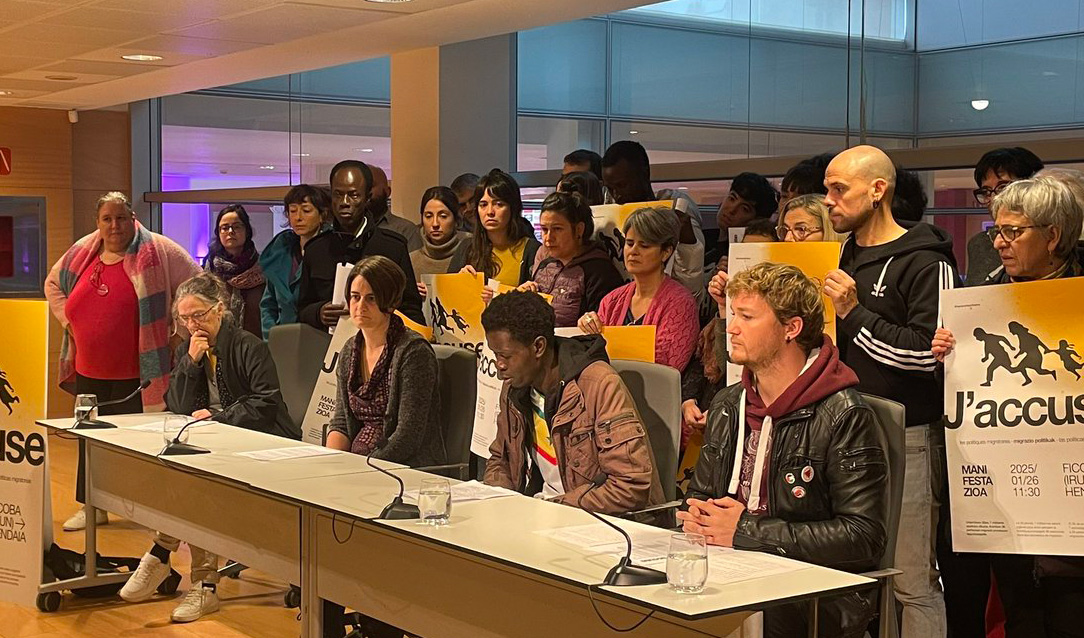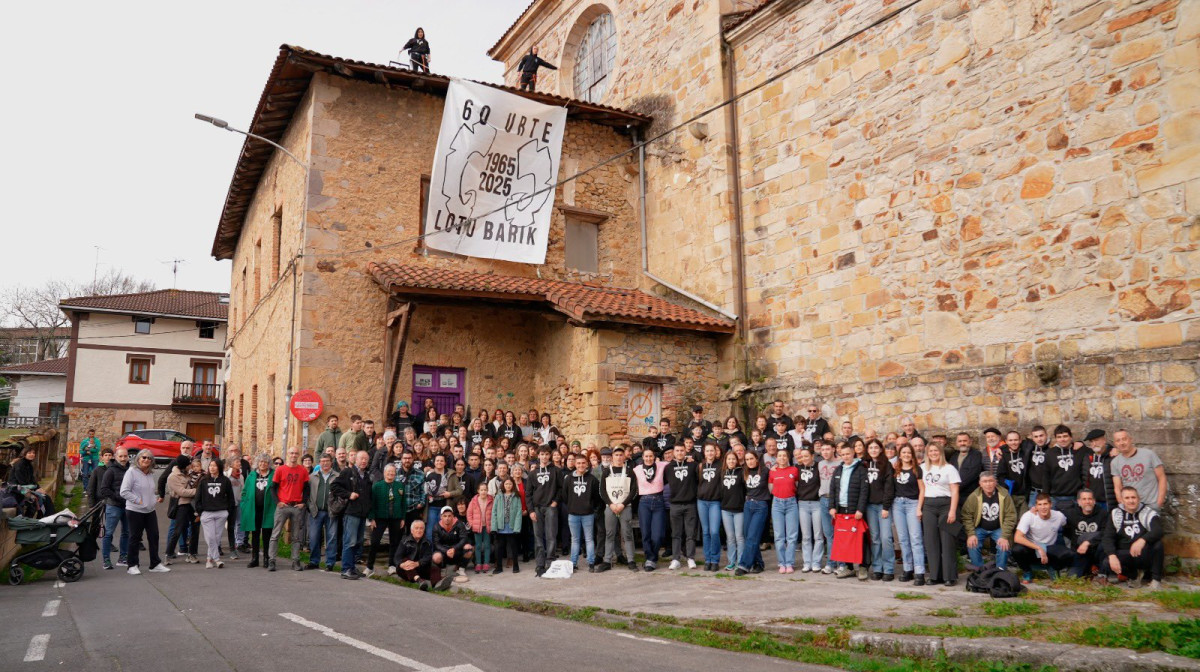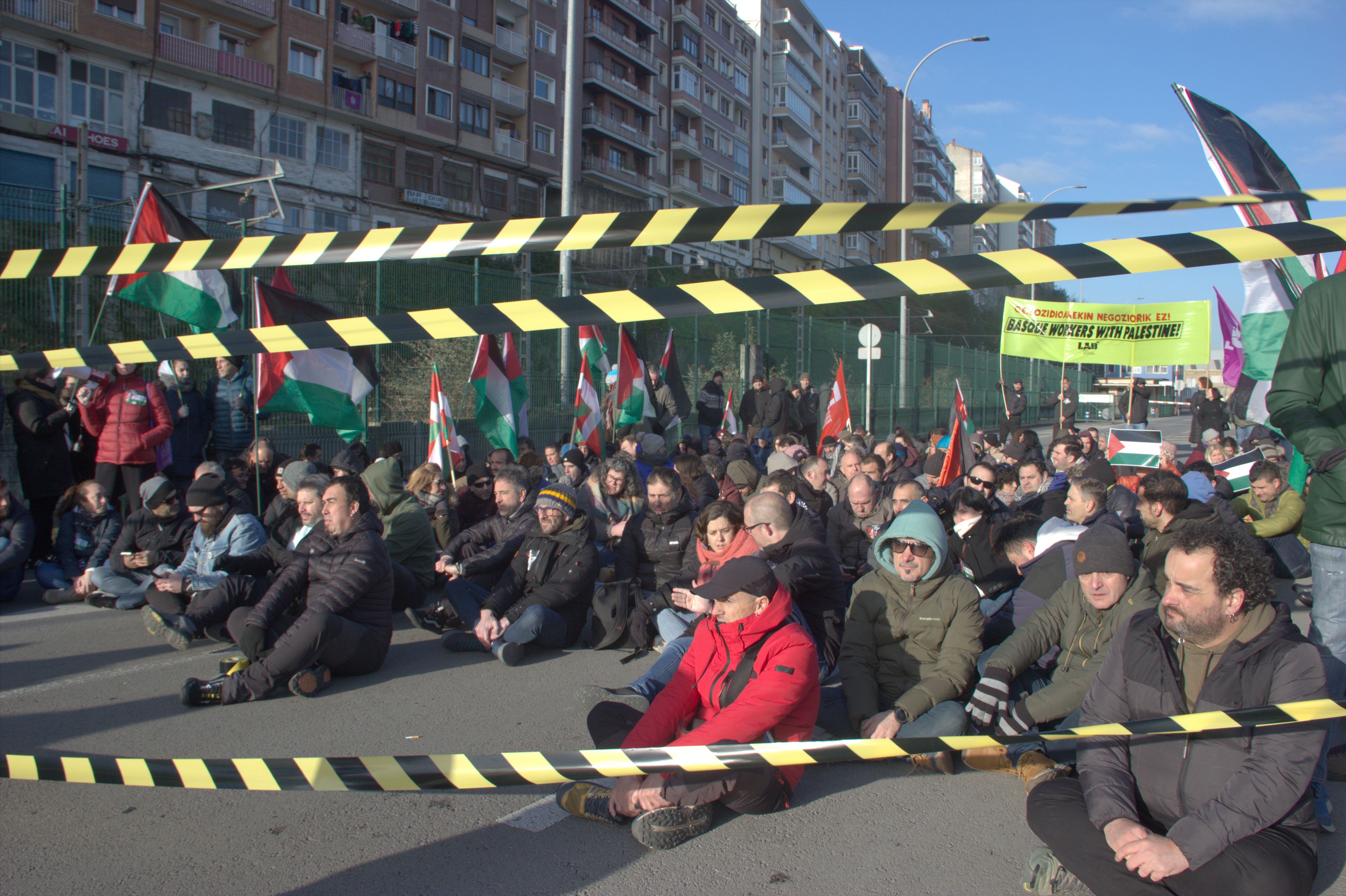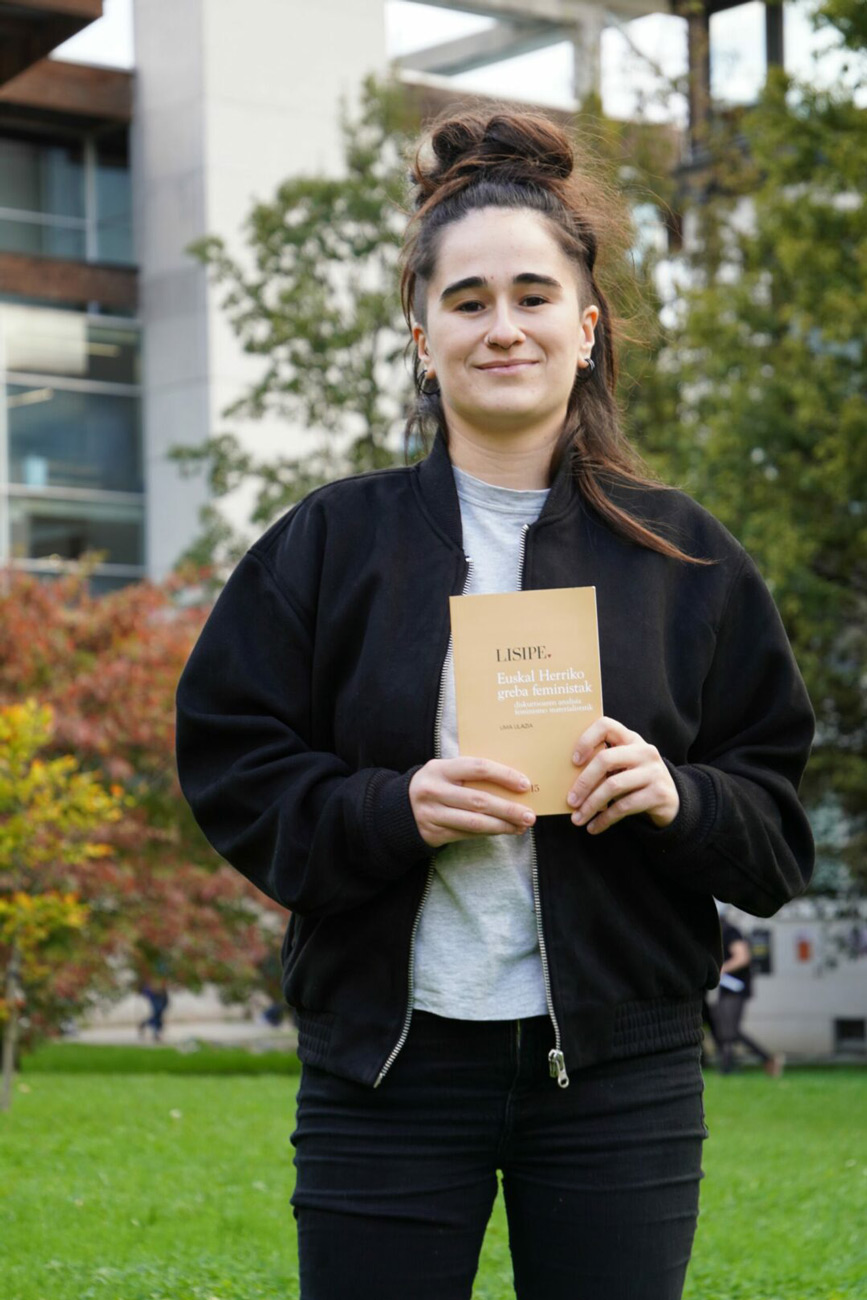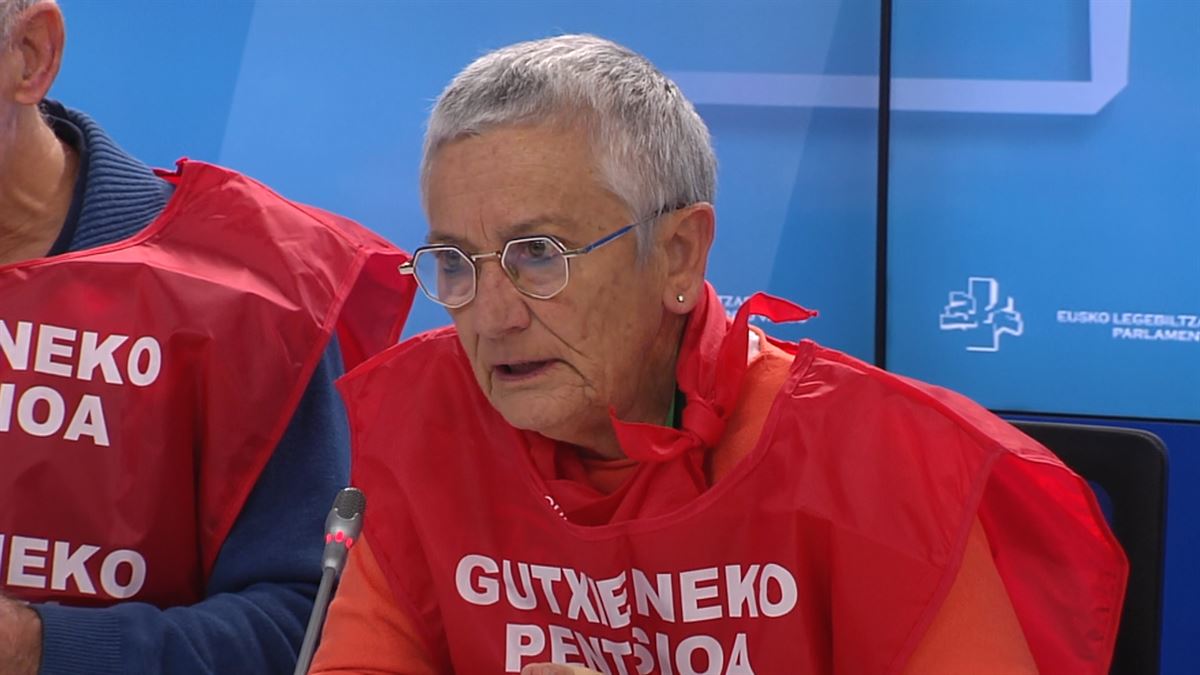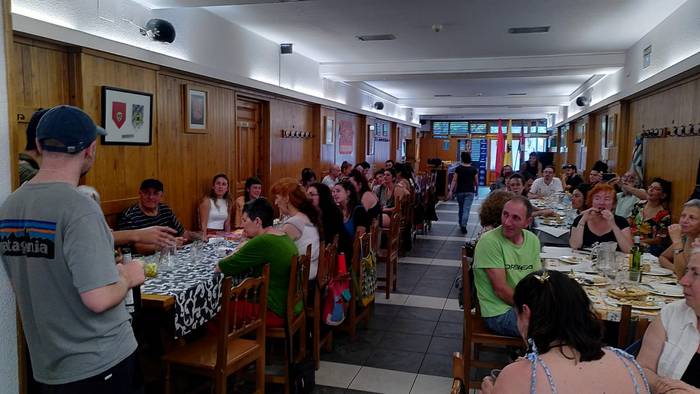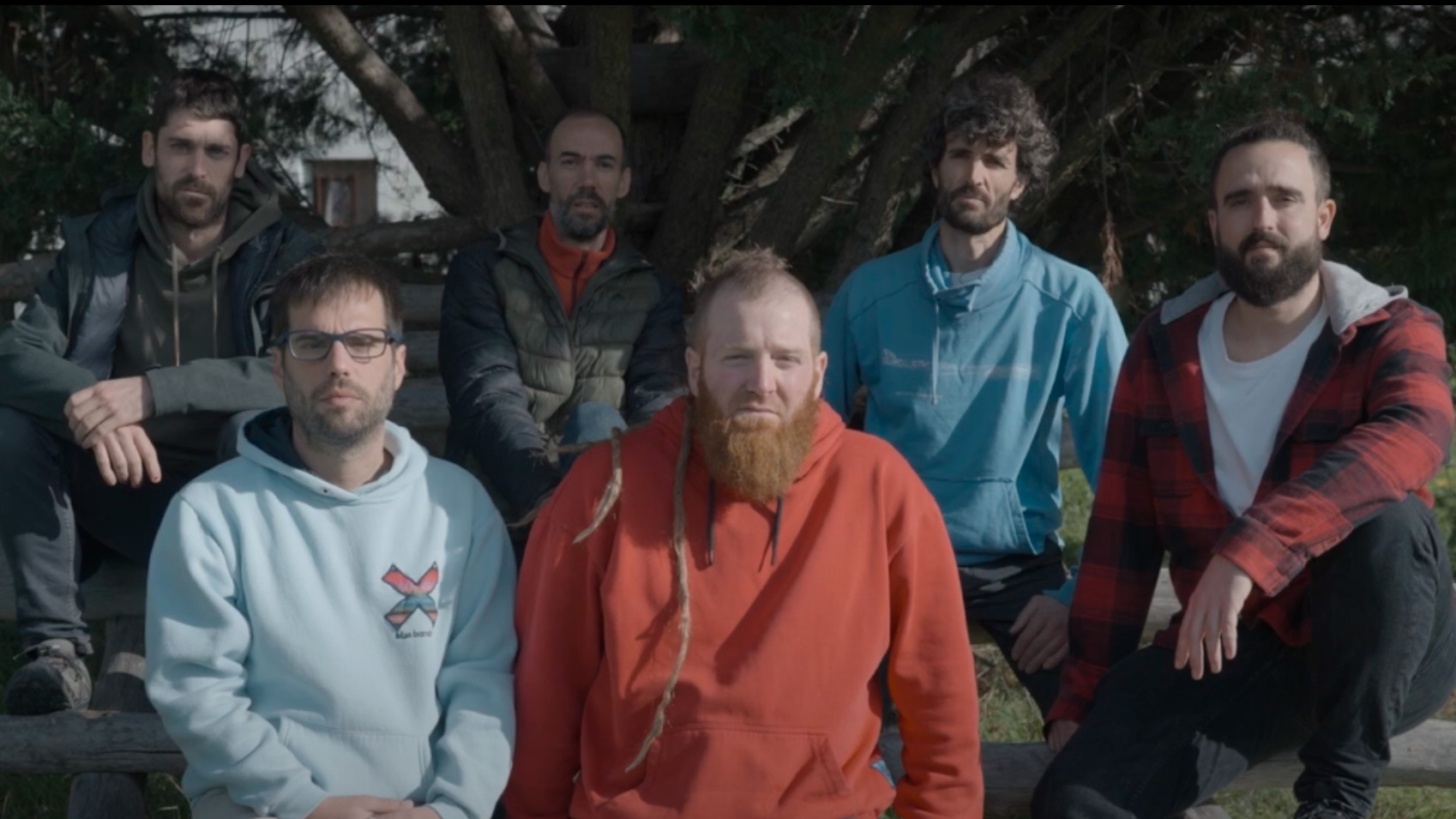Trying to shake off the hangover after the armed conflict
- We want to reflect on alliances, conflicts, disobedience and violence. We want to reflect collectively from the hands of the people who have their feet in internships: Joxemi Zumalabe, a Foundation militant, an organizer of the G7 and the Salda feminist conference already exists, and a friend who is immersed in the protests of the Generalitat.

Forms of struggle are a tool for transformation, not an end. Like thinking, tools must also be placed, connected to the moment and to the place. Social struggle is a dynamic process, with ruptures and continuities, but it is not a chain of isolated and static struggles. For all these reasons, the forms of struggle should always be the subject of controversy on the part of popular action. In search of the most effective moulds to take steps towards utopia, but without understanding effectiveness in an entrepreneurial way: there must be seeds of our utopias in the tools we use.
The Joxemi Zumalabe Foundation began to reflect on the ways of fighting in 2015-2016. After closing a cycle centered on the inner life of popular movements, the foundation decided to focus on the external action of the movements. We met Andere Ormazabal Gastón, Ainhoa Narbaiza Irizar and Jokin Azpiazu Carballo. Zumalabe members have warned us that the process is incomplete and they are not “in a position to give a general picture” or that some opinions may be personal.
Zumalabe members reflect on conflicts, disobedience, violence and alliances, along with members and civil society groups. Why are these and not others? “At that time we chose the living of society.” This soil is what we will use to advance our reflection. The "hangover" after the armed conflict is one of the keys to understanding the current situation, according to zumalaitarras. And there the changes made by the left Abertzale (EA) have a great influence. Firstly, in the priorities: “The majority and articulated sector of popular construction has taken precedence over the institutional realm of the popular movement, and since the legalization of 2011 many militants have fallen to the institutions.” On the other hand, in the attitude towards conflict: it has gone from a positive understanding to an element to largely avoid.
“At this time it seems that the ways of understanding social conflict within popular movements are not reconcilable (...) we believe they are
interposing” Joxemi Zumalabe
EA continues to have a specific weight in popular construction. But there are more movements inside and outside of left-wing nationalism, and they have very different ways of understanding conflict. “At this time it seems that the ways of understanding social conflict within popular movements are not reconcilable (...) but that these diverse views complement each other, we believe they are hindering,” explains Zumalabe in his conflict brochure. What happened in the G7 backlash would be a reflection of this.
In general, conflicts have decreased and normalization has increased in our country in recent years. The levels of conflict that once lived normally turn into extremes; what was disobedience, violence; the ways we thought useful cannot be imagined; the personal and collective risks that were acceptable… however, we gradually fade away our practices and dreams. Standardisation is a continuum that is in one position or another, nesting each one in its own measure but for all.
G7 and disobedience
The G7 has left much pain in the construction of the Basque Country. The abandonment of planned massive disobedient action has been a spectacular aspect of the iceberg. Some of the organizers have chosen to reject the invitation to participate in the report. Toma López Arana participated in the organization of the counterparty and its disobedience in the work team: “It has often been mentioned that it has been a missed opportunity, but it has put us in front of the mirror, it has brought the debate to light.” The most populous sectors of the militancy of Ipar Euskal Herria “committed to social peace,” according to López, avoiding disobedience and confrontation.

But neither those who defend the need for conflict have managed to develop a disobedient public, massive or continuous practice, neither in the equivalent nor in recent years – there are other disobediences: in the movements to protect immigrants, in the occupation, in anti-specialist actions, against social norms…. Disobedience is on everyone's lips, but in the practice of very few. Why? López thinks that the forces are dispersed and that a common compass is needed. It defends the need for a “regeneration” on two bases: “That capitalism cannot be reformulated, that we have to undo; and that we have to build our projects autonomously and horizontally.”
There have been more concrete shortcomings in the conversation with both López and Zumalabe colleagues. In general, the willingness to assume the repressive consequences is lower among the militants, the confrontation is more fearful. There was a time when it was difficult to discuss whether a strategy of confrontation was politically and personally sustainable, and that has caused great damage; perhaps now there are too many calculations and too much certainty is needed before risking anything. The question arises as to the conditions: Are there no conditions for lack of tension and enough active people? On the contrary, is disobedience not an appropriate means of creating new conditions from today?
But there is a desire to go beyond the law in popular construction, and a discomfort and an outrage over the situation. López says that there are movements and debates, that sooner or later some group or initiative will become a stimulus. “We have a support that we didn’t have before and which is very important: facilitators, custody, tools to make assemblies in a good environment… Resources to do the disobedience of tomorrow well.”
Demoak, Bizi! Artisans of Peace, Chamber of Agriculture... We have asked López what Iparralde has learned from what has historically been a very ‘suregentric’ people. He responds by expanding the focus and saying that we must learn from the riots and protests that are taking place in the world. From Algeria, Iran, Chile, Jaca, Ecuador, Sudan -- and also from Catalonia.
.jpg)
The Catalan Countries: confrontation above, violence for the first time
“In the area of forms of struggle, there has been a further step in the independence process,” explains Arran, spokesman for the youth organization, Adriana Roca, on the cycle of protests that has opened after the sentencing. More confrontational molds have spread. “Popular independence further recognizes conflict and instability.” Within this ‘popular’ independence, Roca introduces the independence left, as well as many of the pillars of the majority parties and the ANC and Omniun associations.
Disobedience has been practiced and popularized for many years. The 2017 referendum was an exercise of mass, popular and institutional disobedience. But since then understanding has changed, according to Roca. “Disobedience was very choreographed, regulated, thought for photography. It seemed that cutting a road was violence.” Since the judgment, disobedient initiatives seek and accept greater confrontation. Road cuts, infrastructure blockades, unreported mobilizations... Roca has set the example of the tsunami. The aim of the actions is a great confrontation and a more active attitude of the people, but their support is massive – people have exceeded the limits of non-violence that the Tsunami constantly underlines.
The attitudes of ANC, Omnium, CoR or Tsunami show the importance of demanding movements in autonomy and attitude towards parties
The Catalan countries have been very vigilant in recent years in view of Basque citizenship. What lessons do your practices offer us? The positions of ANC, Omnium, CoR or Tsunami show the importance of demanding movements with autonomy and attitude towards parties. In times of complicity and enmity – the difference between ANC and Cinct Esku Dago in this area is a metaphor that clarifies the totally different model governing each country. We have again seen that disobedience has the potential to combine conflict and mass. But this potentiality is the result of years of work, starting from the smallness. Do you remember the Arenys de Munté referendum? Ten years have passed. That is, disobedience should be trained in everyday life: one cannot go from one day to another from generalized obedience to mass disobedience. Finally, disobedience has the ability to shift the center of gravity from the process to the left. We are talking about very different realities, yes, but the success of the call for the Basque Tsunami shows that if it is right in the right key, disobedience in Catalonia can be a stimulus in the Basque Country. Today, however, Basque independence is mobilized with more enthusiasm and determination by Catalonia than by Euskal Herria.
For the first time we have seen forms of violent struggle in the independence process in Catalonia – we have no room to discuss what violence is. It has been momentarily broken with the main topic of the process: nonviolence. But there is violence and there is violence. Catalan is characterized by its high degree of spontaneity, lack of organization behind it, lack of appearances that allow it to develop permanently or self-defense, among other aspects. The protagonists have been young people, mostly unorganised, who have actively participated. Roca has pointed out that the frustration and anger that occurs in relation to the process is added to the perception of a dark social, climate, economic and political future. Although there have been criminalizing attitudes within independence, there have been minorities, many sectors have supported incidents and young people, and the vast majority have been, to a greater or lesser extent, sympathetic.
Roca has said that repression has not yet managed to spread fear and that, on the contrary, multi-form support networks have been set up. But does intermediate disturbances serve to increase the number of independentists? Or does it happen the other way around? “It depends where you want to spread it,” said Roca: “We want to open it on the left and on the bottom.”
An honest reading of the political violence of 50 years based on its own ethical and political parameters would favor the construction of a country
The debate on violence has nothing to do with the Basque country. More than argue, not argue. In the closed discussion and reflection sessions organized by Zumalabe, the participants thanked them for the same opportunity, as it has become a taboo. The members of Zumalabe have warned that there is no reflection or transmission about the teachings, nor their own account. We are talking about a very important part of a 50 year fighting cycle of the recent past, which has left deep traces in Basque society. Emptiness is detrimental to the struggles of the present and the future. A sincere reading from its own ethical and political parameters would favor the construction of a country in which mistakes and achievements large and small feed new struggles.

Feminist Conferences and Alliances of the Basque Country
Alliances, according to Zumalabe members, have been strengthened since the beginning of the armed struggle. In the short term, they are woven around a specific situation or a specific, longer term or strategic campaign. The latter are more difficult to build and maintain. There are also moments of hostility among popular movements, such as the clashes that some of the movements around the class have had with EE, feminism or autonomous sectors. Competition is perceived to occupy the space of radicality that has been left empty. But today we will confine ourselves to alliances.
One of the keys to alliances is to succeed in the tension between unity and diversity. Agreeing agendas, contents, political cultures or methodologies requires effort and rarely enough is invested. At the same time, they can serve to give bellows to actions and demands for movements of little force. This is one of the achievements that antimilitarists have highlighted Zumalabe with the “War Begins Here” initiative. They cite a danger: building content alliances that claim the goodness of capitalism for fear of savage neoliberalism and the extreme right.
The challenge is to create multiple alliances, which are radical for all. Those who keep the revolutionary North but respond to the needs of everyday life at once. Lately, there has been a proliferation of voices claiming the need for a “Communist Manifesto” of the twenty-first century, a common north that unites the entire left. The proposal of Arruzza, Bhattacharya and Fraser of “feminism for 99%” is a contribution in this sense that attaches special importance to alliances.
"It's going to be a work of years, there's going to be conflict, there's going to be pain. It is difficult to cultivate power relations or accept structural racism”
Cony Carranza
Plural alliances face another difficult challenge: to combat the asymmetries of power, privileges and oppression among collectives. If someone has tried to create alliances and look ahead to their internal imbalances, that's feminism. Cony Carranza Castro is a rationalized feminist. He has participated in the preparation of the Salda Dago conference of the feminist movement of the Basque Country, and has promoted the table of the decolonial days.
Carranza began years ago the process to take its place in the white feminism of the Basque Country. In the Women of the World first, in the World March of Women or in the Charter of Social Rights later, in... He and other women gradually became a “bridge”, and one of the results of this bridging work is the decolonality in Salda Bada’s central program. Sound result.
Carranza was pleased that the decolonality table was “a turning point”. Many later congratulated her, but resistance and anger were also ignited among the white feminists who felt unjustly pointed out. Carranza was not too surprised: "This is going to be a work of years, there's going to be conflict, there's going to be pain. It is difficult to work power relations or accept structural racism.”

It is the result of the alliances we have worked on over the years, on the one hand, as a reflection of what we must continue to work on.
In the rest of the axes of oppression similar resistances also emerge when the lower ones question the upper ones. What's more: when we're down, the attitudes that we consider legitimate or transformative with respect to above are not so acceptable when what's up above is yourself. From below we can question with rage at the top, use the ‘Thick Brooch’ and name it as a group –Spanish, bourgeois…–. On the contrary, we ask the person at the bottom – male chauvinists, white colonialists… – to use a friendly pedagogical tone, a ‘fine brush’ and to differentiate it between people. Carranza is an educator, she says that sweetness and patience prevail, even if it is sometimes difficult for her. “But I don’t rule out rabies.” That is why she fought for the racialized “with another presence” to have a voice at the table of decoloniality, more uncomfortable for many.
“It’s not about distributing blame, it’s about taking responsibility for making them accomplices in the struggle,” Carranza explained. Accepting and working privileges and freeing without paternalism the space that belongs to others is important, but also sharing the pains: “Here too there is pain and suffering, blood stories, missing. In the meetings we have had with Bilgune Feminist we have talked about the pains and privileges of each”.
Increased sensitivity and more blisters
After this partial review, the question. What keys should we take into account? The members of Zumalabe have underlined three ideas: to value the molds from efficiency so that the tools do not become objectives; to maintain the positive understanding of the conflict, to tense or to confront because it is democratizing; and to put the generations in dialogue before the ruptures that have occurred in the ways of understanding and/or military the struggle. López has once again insisted on the need to “reinvent and unite” and claim that we must learn from our history, feminism and the riots that are arising in the world. Carranza has raised the flag of “sentimentalism,” the passage from “head to body and senses.” She molded Emma Goldmann's famous proverb and said: “If we can’t look in the eye, it’s not my revolution.”
Rationally studied, popular construction and its forms of struggle do not seem to be very healthy. We must overcome, among other things, the hangover and obstacles mentioned by the members of Zumalabe. But this pessimism has something to do with the nostalgia of an idealized past, and on the other hand, Euskal Herria has not become deserted. There are practices, humus, tests and proposals. Rational analyses give reasons to darken the face and disorientation prevails. But people and society have little rational, we are unpredictable for good and for evil. And the world, the world is unpredictable. We are in a moment of transformation, in the coming years the Basque people will face unknown social, political and economic scenarios. The challenge is to have the ability to influence these scenarios. If there is no credible alternative on the left, people will seek solutions, even more on the right, in the face of uncertainty and fear. The popular construction must intensify its forms of struggle to act in reality at all times, analyzing the context and itself. But these tools have to be dirty, in an incessant lack of use.
In any case, more than just new juicy books in the head – therefore more than reports like this – popular culture needs more sensitivity in the skin and in the casings and more beans in the hands.
Larrabetzuko Hori Bai Gaztetxeak 60 urte bete ditu. Euskal Herriko Gaztetxe zaharrena da Larrabetzukoa.
A ghost crosses the kitchens: The ghosts of Carlos.
Karlos has not been presented to the Master Chef Celebrity. After analyzing its culinary heritage, it is very clear that it will not overcome the selection of its opponents. In fact, the Academy of Gastronomy and the media... [+]
Iaz jarri zuten martxan lehenengoz Alde Zaharrean Jantoki Herrikoia. Auzokoak elkartu eta mahaiaren bueltan konpainian bazkaltzea da gakoetako bat. "Auzotarrak elkarren artean ezagutu eta komunitatea sortzea da gure nahia", azaldu du AZ Ekimeneko kide Asier... [+]
Goldatz talde feministak antolatua, ortziralean, urtarrilaren 3an, Jantzari dokumentala proiektatuko dute Beralandetan (17:30ean) eta biharamunean, urtarrilaren 4an, Berako bestetako tradizioak aztergai izanen dituzte Maggie Bullen antropologoarekin leku berean (10:30).
Ander Magallon, Mikel Irure eta Xabier Jauregi Metropoli Forala saioan egon dira maskulinitate berrien inguruan mintzatzen.











